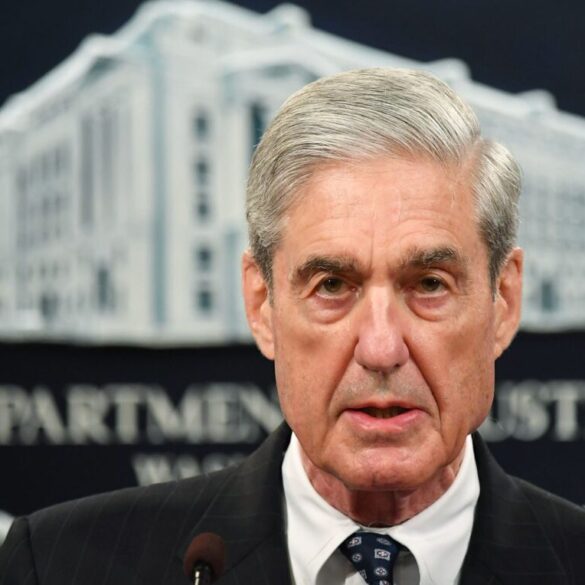
Special Counsel Robert Mueller speaks on the investigation into Russian interference in the 2016 Presidential election, at the US Justice Department in Washington, DC, on May 29, 2019. (Photo by MANDEL NGAN/AFP via Getty Images)
The Justice Department on Wednesday released a 2019 memo that revealed why former President Donald Trump should not be prosecuted for obstruction of justice in connection to then-special counsel Robert Mueller’s investigation.
Dated March 24, 2019, the memo was written by Assistant Attorney General Steven Engel and Principal Associate Deputy Attorney General Ed O’Callaghan, who claimed that none of Trump’s actions documented in Mueller’s report should be viewed as obstruction of justice. Those actions include firing former FBI Director James Comey and telling a top White House lawyer to fire Mueller.
“We conclude that the evidence described in Volume II of the Report is not, in our judgment, sufficient to support a conclusion beyond a reasonable doubt that the President violated the obstruction-of-justice statutes,” said the unredacted document, released to several major news outlets and posted online. “In addition, we believe that certain of the conduct examined by the Special Counsel could not, as a matter of law, support an obstruction charge under the circumstances.”
A Department of Justice spokesperson confirmed the memo’s authenticity.
The left-wing Citizens for Responsibility and Ethics, based in Washington, D.C., filed a Freedom of Information Act lawsuit three years ago to make the document public.
Appeals Court Ruling
A federal appeals court rejected Justice Department arguments and ruled on Friday the memo must be released to the public. A highly redacted variant of the memo was released in 2021.
“It would be rare for federal prosecutors to bring an obstruction prosecution that did not itself arise out of a proceeding related to a separate crime,” the two officials also wrote in the memo.
The memo also asserts there was considerable evidence that Trump acted in his official capacity, including pushing to get Mueller fired, “because he believed the investigation was politically motivated and undermined his administration’s efforts to govern” and “not for an illegal purpose.”
Ultimately, Mueller’s probe concluded that Trump did not collude with the Russian government to influence the 2016 election.
Later, Attorney General William Barr determined that the report Mueller had “not sufficient to establish” that Trump obstructed justice.
“Apart from whether the acts were obstructive, this evidence of non-corrupt motives weighs heavily against any allegation that the President had a corrupt intent to obstruct the investigation,” Barr said in April 2019.
The former president has long said that Mueller’s investigation as well as the Russia collusion narrative are hoaxes designed to harm his political prospects. That same narrative and similar tactics are still being used against him following the FBI’s raid of Mar-a-Lago earlier this month, Trump also contends.
An Office of Legal Counsel opinion issued in 1973 and reaffirmed in 2020 concluded that federal criminal charges should not be pursued while a president remains in office.
